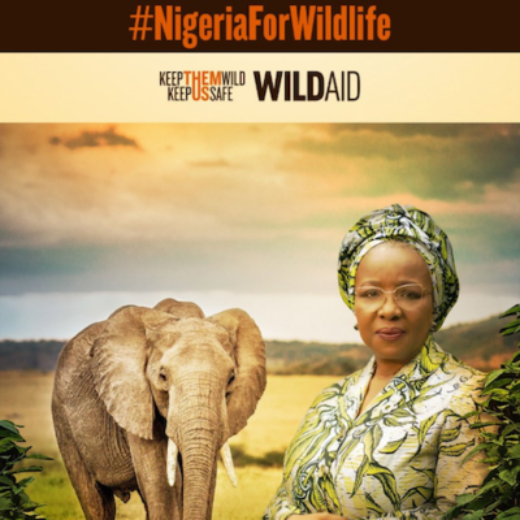
WildAid unveils campaign in partnership with Optimum Exposures, JC Decaux, Pulse, over 16 media houses
By Ibidun Banjoko
WildAid has entered into a strategic partnership with Optimum Exposures, JC Decaux, Pulse Out-of-Home advertising companies and over 15 media houses in Nigeria, in a bid to reduce demand for illegal bushmeat in major urban centres, support enforcement activities to tackle the illegal wildlife trade and raise awareness of disappearing wildlife using the slogans “Keep them wild, keep us safe” and “Poaching steals from us all”.
The campaign includes TV Public Service Announcements (PSAs), billboards, social media campaigns, radio and TV series with ambassadors from music, Nollywood, sports, religion, and entertainment.
Developed in partnership with the Ministry of Environment and other government agencies, the campaign stars Afrobeats artists Davido and Mayorkun, Everton FC and Nigeria footballer Alex Iwobi, Nollywood star Stephanie Linus, comedians Emanuella and Josh2Funny, Mercy Jessica Odjugo (Miss Tourism Nigeria) and religious leaders from the Nigeria Inter-Religious Council (NIREC). International stars, including Lupita Nyong’o, Danai Gurira, Djimon Hounsou, Jackie Chan and Kung Fu Panda will also be featured in the campaign.
There are also messages from public figures such as Sharon Ikeazor, Nigeria’s Federal Minister of State for Environment, Prof. Akin Abayomi, the Honourable Commissioner for Health of Lagos State.
Commenting on the campaign, the Minister of State for Environment, Sharon Ikeazor, disclosed that the government was in collaboration with relevant agencies to stop wildlife exploitation and trafficking. She said the President Muhammadu Buhari led administration is committed to protecting, restoring and promoting sustainable use of our biodiversity.
“The Federal Government is committed to protecting, restoring and promoting sustainable use of our biodiversity. We will support the sustainable management of forests, combat desertification, land degradation and half biodiversity loss,” she said.
“Our collaboration with relevant agencies and stakeholders to stem the tide of wildlife overexploitation and trafficking has led to the development and implementation of strategies to combat corruption risk associated with transnational organised wildlife crime,” she added.
This campaign is the largest campaign by WildAid since invention.WildAid is a non-profit wildlife conservation organisation that is dedicated to protecting wildlife from illegal trade and other imminent threats.
On his part, Peter Knights, founder and President of WildAid, said the public awareness campaign is to stop the illegal consumption of bushmeat and ivory trade in Nigeria.
The campaign is geared towards reducing to the barest minimum the demand for illegal bushmeat consumption in major urban centres. The campaign will also support enforcement activities to tackle the illegal wildlife trade. Knights lamented that Nigeria had lost some wonderful species to habitat destruction and poaching.
“With its dynamism and cultural influence, Nigeria can turn things around for wildlife and become a regional leader in wildlife protection, which can boost the economy through tourism and safeguard the Nigerian public from zoonotic disease,” Mr Knights said, adding, “Today, Nigeria has no surviving Rhinos, Giraffes or Cheetahs, and fewer than 50 lions, 100 gorillas, 500 elephants and 2300 chimpanzees left in the wild. “Despite ongoing conservation efforts, poaching for body parts and meat along with habitat loss from deforestation, infrastructure development and agricultural expansion threaten wildlife in Nigeria.
“Illegal bushmeat consumption is widespread across Nigeria’s top cities. A recent survey by GlobeScan revealed that 71 per cent of the respondents say they have consumed bush meat at some point in their lives,” he added.
According to the Commissioner for Health in Lagos State, Prof Akin Abayomi, consumption of bushmeat was directly and indirectly responsible for the recent increase in dangerous and deadly infectious diseases such as Ebola, COVID-19 and Lassa fever.
His words: “The recent increase in dangerous and deadly infectious diseases such as Ebola disease, COVID-19 and Lassa fever can be directly or indirectly linked to the animal kingdom. Research has shown that 60% of existing infectious diseases are zoonotic (from animal origin) and 80% of these zoonotic pathogens with potential to be weaponised.
“Uncontrolled deforestation and wildlife killing, and consumption has led to transfer of deadly diseases from wild animals to human. These diseases caused death of thousands in sub-Saharan Africa and also lead to economic loss worth billions of dollars.”



Comment
No comments found.